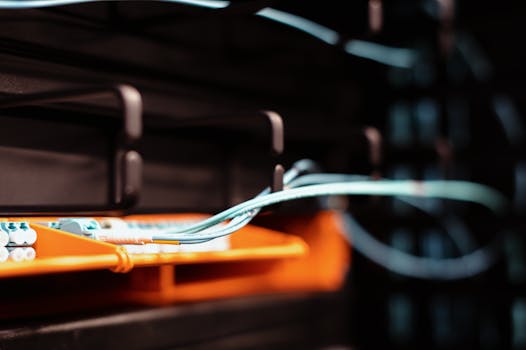
The Role of Fiber Companies in Africa’s Smart City Initiatives
Fiber companies play a crucial role in Africa’s smart city initiatives, providing the necessary infrastructure for connectivity and innovation. As the continent continues to urbanize and grow, the demand for reliable and high-speed internet connectivity is increasing, and fiber companies are at the forefront of meeting this demand.
Africa’s smart city initiatives aim to create sustainable, efficient, and livable cities, and fiber companies are essential in achieving this goal. By providing the necessary infrastructure for connectivity, fiber companies enable the implementation of various smart city solutions, such as intelligent transportation systems, smart energy management, and public safety systems.
One of the key benefits of fiber companies in Africa’s smart city initiatives is the provision of high-speed internet connectivity. Fiber optic cables offer fast and reliable internet speeds, which are essential for the implementation of various smart city solutions. With the increasing demand for online services, fiber companies are playing a crucial role in providing the necessary infrastructure to support this growth.
Another benefit of fiber companies in Africa’s smart city initiatives is the creation of jobs and stimulation of local economies. The deployment of fiber optic cables requires a significant amount of labor, which creates job opportunities for local communities. Additionally, the presence of fiber companies can attract other businesses and investments, stimulating local economies and contributing to the overall development of the continent.
In addition to the benefits mentioned above, fiber companies are also contributing to the development of digital skills in Africa. As the continent continues to adopt digital technologies, the demand for skilled professionals is increasing, and fiber companies are playing a crucial role in addressing this demand. By providing training and development programs, fiber companies are helping to build a skilled workforce that can support the implementation of smart city solutions.
Challenges Facing Fiber Companies in Africa’s Smart City Initiatives
Despite the benefits of fiber companies in Africa’s smart city initiatives, there are several challenges that need to be addressed. One of the major challenges is the high cost of deploying fiber optic cables, which can be a significant barrier to entry for many cities. Additionally, the lack of infrastructure and limited access to funding can make it difficult for fiber companies to deploy their services.
Another challenge facing fiber companies in Africa’s smart city initiatives is the regulatory framework. The regulatory environment in many African countries can be complex and unpredictable, which can make it difficult for fiber companies to operate. Furthermore, the lack of standardization and coordination among different stakeholders can create challenges for the deployment of fiber optic cables.
Security is also a major concern for fiber companies in Africa’s smart city initiatives. The deployment of fiber optic cables requires a significant amount of investment, and the risk of damage or theft can be high. Additionally, the lack of awareness and education among local communities can create challenges for the adoption of fiber-based services.
Case Studies of Successful Fiber Company Initiatives in Africa
Despite the challenges mentioned above, there are several successful fiber company initiatives in Africa that are worth highlighting. One example is the deployment of fiber optic cables in Rwanda, which has enabled the country to become a hub for technology and innovation. The Rwandan government has invested heavily in the development of its fiber optic network, which has attracted several major technology companies, including Google and Microsoft.
Another example is the deployment of fiber optic cables in South Africa, which has enabled the country to become a leader in the adoption of smart city solutions. The South African government has invested heavily in the development of its fiber optic network, which has enabled the implementation of various smart city solutions, including intelligent transportation systems and smart energy management.
In Nigeria, fiber companies such as MainOne and MTN are playing a crucial role in the deployment of fiber optic cables. These companies have invested heavily in the development of their fiber optic networks, which has enabled the implementation of various smart city solutions, including public safety systems and smart energy management.
Conclusion
In conclusion, fiber companies play a crucial role in Africa’s smart city initiatives, providing the necessary infrastructure for connectivity and innovation. Despite the challenges facing fiber companies, there are several successful initiatives that are worth highlighting. As the continent continues to urbanize and grow, the demand for reliable and high-speed internet connectivity is increasing, and fiber companies are at the forefront of meeting this demand.
The benefits of fiber companies in Africa’s smart city initiatives are numerous, including the provision of high-speed internet connectivity, creation of jobs, and stimulation of local economies. Additionally, fiber companies are contributing to the development of digital skills in Africa, which is essential for the implementation of smart city solutions.
However, there are several challenges that need to be addressed, including the high cost of deploying fiber optic cables, lack of infrastructure, and limited access to funding. Furthermore, the regulatory framework and security concerns need to be addressed to create a favorable environment for the deployment of fiber optic cables.
As the continent continues to adopt digital technologies, the role of fiber companies in Africa’s smart city initiatives will become increasingly important. It is essential for governments, private sector companies, and other stakeholders to work together to address the challenges facing fiber companies and to create a favorable environment for the deployment of fiber optic cables.




